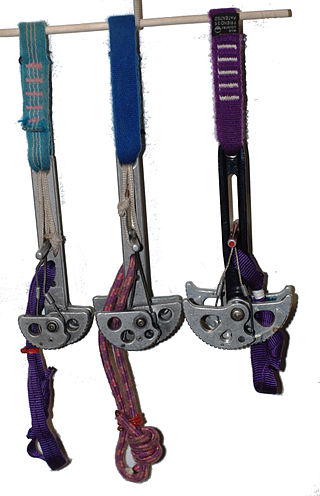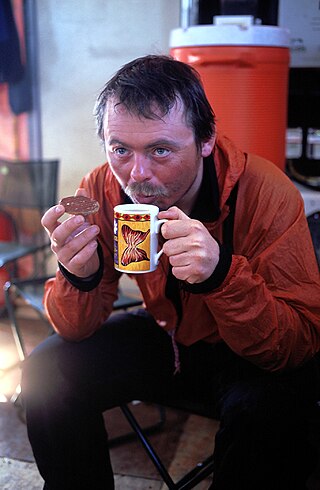Peter Boardman was an English mountaineer and author. He is best known for a series of bold and lightweight expeditions to the Himalayas, often in partnership with Joe Tasker, and for his contribution to mountain literature. Boardman and Tasker died on the North East Ridge of Mount Everest in 1982. The Boardman Tasker Prize for Mountain Literature was established in their memory.
The Boardman Tasker Prize for Mountain Literature is an annual prize of £3,000 awarded by the Boardman Tasker Charitable Trust to an author or authors for "an original work which has made an outstanding contribution to mountain literature". The prize was established in 1983 in memory of British climbers Peter Boardman and Joe Tasker, both of whom wrote books about their mountaineering expeditions, after their deaths on the northeast ridge of Mount Everest in 1982. It can be awarded for a piece of fiction or non-fiction, poetry or drama, although the work must have been written in English. The prize is announced at the annual Kendal Mountain Festival.
Thomas Walton Patey was a Scottish climber, mountaineer, doctor and writer. He was a leading Scottish climber of his day, particularly excelling on winter routes. He died in a climbing accident at the age of 38. He was probably best known for his humorous songs and prose about climbing, many of which were published posthumously in the collection One Man's Mountains.

Johnny Dawes is a British rock climber and author, known for his dynamic climbing style and bold traditional climbing routes. This included the first ascent of Indian Face, the first-ever route at the E9-grade. His influence on British climbing was at its peak in the mid to late-1980s.
Alan Paul Rouse was the first British climber to reach the summit of the second highest mountain in the world, K2, but died on the descent.

Jim Perrin, is an English rock climber and travel writer.
Stephen Venables is a British mountaineer and writer, and is a past president of the South Georgia Association and of the Alpine Club. He is the first Briton to ascend the summit of Mount Everest without bottled oxygen.
Mark Twight is an American climber, writer and the founder of Gym Jones. He rose to prominence as a mountaineer in the late 1980s and early 1990s with a series of difficult, dangerous alpine climbs in various ranges around the world. His radical, light-weight approach to alpinism has seen him regarded as an influential figure in the single-push movement.

Joe Tasker was a British climber, active during the late 1970s and early 1980s. He died while climbing Mount Everest.
David Stuart Roberts was an American climber, mountaineer, college professor, and author of books and articles about climbing and the history of the American Southwest. He was particularly noted for his books The Mountain of My Fear and Deborah: A Wilderness Narrative, chronicling major ascents in Alaska in the 1960s, which had a major impact on the form of mountaineering literature.

Wild Country is a major manufacturer of rock-climbing equipment, and is most noted for introducing the Friend, a spring-loaded camming device. The company is based in Tideswell in the English Peak District, close to some of the UK's most popular climbing areas.
Michael Fowler is a British rock climber, ice climber, mountaineer and climbing author. He is internationally noted for his alpine climbing and was awarded the Piolet d'Or three times, with Paul Ramsden, in 2003, 2013, and 2016, for alpine-style first ascents of faces in the Himalayas. Fowler was one of the first British rock climbers to free an E6-graded traditional rock climbing route, and the first ice climber to free a consensus grade VI mixed Scottish winter route.
The Banff Mountain Book Festival is an annual book festival held at the Banff Centre in Banff, Canada.
Andy Cave is a British mountaineer, mountain guide, and motivational speaker. He was nominated for the Piolet d'Or for his first ascent of the North Face of Changabang in 1997, and won the Boardman Tasker Prize for Mountain Literature in 2005.

Andrew Kirkpatrick is a British mountaineer, author, motivational speaker and monologist. He is best known as a big wall climber, having scaled Yosemite's El Capitan over 30 times, including five solo ascents, and two one-day ascents, as well as climbing in Patagonia, Alaska, Antarctica and the Alps. He has also crossed Greenland by ski. In 2014 he guided Alex Jones up Moonlight Buttress, Zion National Park, raising £1.9 million for Sport Relief.
Ron Fawcett is a British rock climber and rock climbing author who is credited with pushing the technical standards of British rock climbing in traditional, sport, bouldering and free soloing disciplines, in the decade from the mid-1970s to the mid-1980s, and of pioneering the career of being a full-time professional rock climber. At the end of the 1970s to the early 1980s, Fawcett was widely considered the best and most notable rock climber in Britain.

Philip "Jimmy" Jewell was a British rock climber and free soloist who was active during the 1970s and 1980s.
Alex MacIntyre was a British mountaineer in the 1970s. He is known for developing new climbing techniques that enabled ascents not previously accomplished.

The Totem Pole is a sea stack popular amongst rockclimbers in the Tasman National Park, Tasmania, Australia. It contains a number of climbing routes, all of which require a Tyrolean traverse to return to the mainland, and is famous for being the site of the 1998 accident which caused British climber Paul Pritchard's hemiplegia.
Robert Andrew Pollitt was a British rock climber who was one of the most prominent traditional climbers and sport climbers of the late 1980s and early 1990s. In 1992, after having successfully repeated Punks in the Gym in Australia, the world's first-ever 8b+ (5.14a) graded sport climbing routes, he quit climbing and permanently emigrated to Australia. In 2016, Pollitt published an autobiography, titled Punk in the Gym. He died from a cerebral aneurysm on 13 November 2019.








